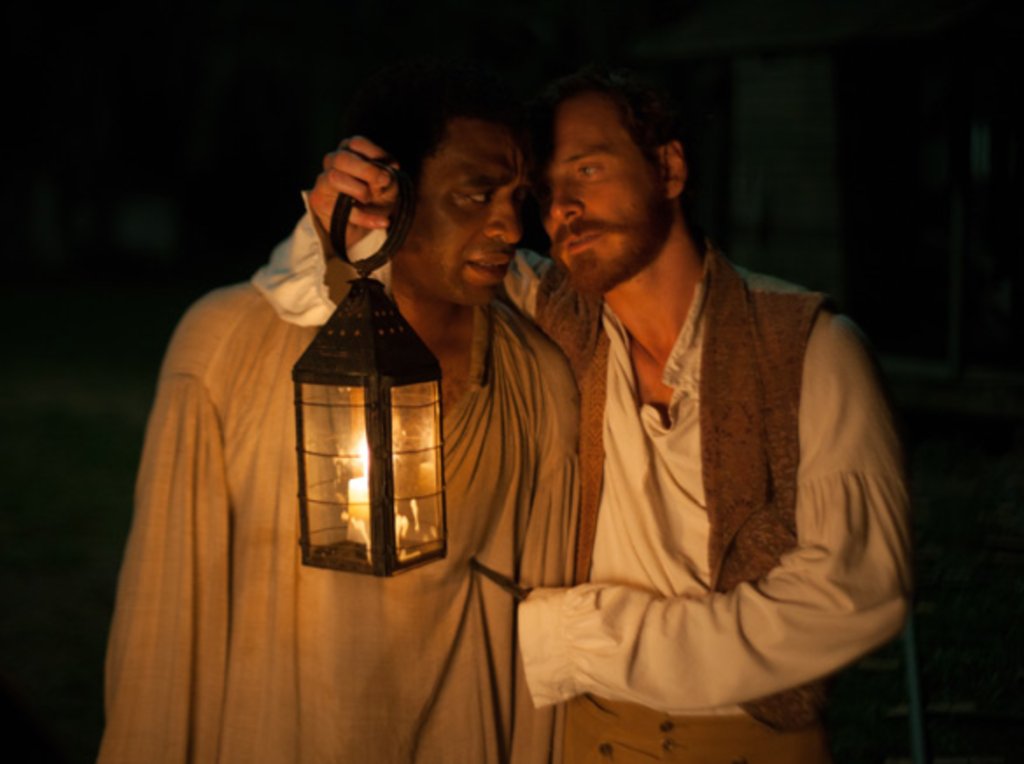“12 Years a Slave” Is a Beautiful Condemnation of An Unthinkable National Sin
November 20, 2013
British artist Steve McQueen’s films, to this point, have been stripped-down, simple and effective — 2008’s Hunger focused on the debilitating psychological impact of Bobby Sands’ 1981 starvation strike, where 2011’s Shame was a clinical, cold examination of sex addiction. Both were anchored by fearless performances by Michael Fassbender, but more importantly the two represented a total harmony of theme and technique — with McQueen’s exquisitely composed shots often using space and color to reflect the empty spiritual conditions of his embattled protagonists.
His new film, 12 Years a Slave, however, speaks to a much more vast discontent — nothing less than America’s most despicable institution, slavery, and so by extension America itself. It uses the 1853 autobiography of Solomon Northrup, a free black man kidnapped and entrapped in various slavers’ homes for twelve years, and transforms the deeply personal tale into something of universal appeal and horror. By showing history’s devastating impact on multitudes of African-Americans through one singular nightmare, 12 Years a Slave is as keen a deconstruction of the American myth as any film, book, album, or cultural thinkpiece in years. There is no angrier film in theaters right now and there is none of greater importance.
Solomon Northrup is played by great dignity by Chiwetel Ejiofor, a long-respected supporting actor (Children of Men, Inside Man) finally getting his long-deserved showcase. Nearly every shot in the film is witnessed directly from his perspective, and Ejiofor nails the flurry of outrage, helplessness and quiet, resolved dignity that Solomon’s story entails. One of the more distinctive choices made by screenwriter John Ridley, however, is the decision to make 12 Years into a near-chamber drama; rather than taking a “traditional biopic” approach and shallowly skimming through the most ‘important’ events of Northrup’s story, the film is actually something of a series of extended conversations between Northrup and those around him
And while much of the film may be Ejiofor’s showcase, the ensemble here is a truly remarkable one. Michael Fassbender and Sarah Paulson just may dominate the film as Edwin and Mary Epps, a domineering slave-owning couple into whose clutches Northrup falls for the final two acts of the film, and Brad Pitt radiates mature wisdom as a Canadian carpenter who comes to oppose these two. Lupita N’yongo is a revelatory breakout as a female slave that gradually loses her will to live.
McQueen takes a totally unsparing eye to the psychological and physical torment of slavery. As admirable, even excellent, as Django Unchained was, it still had a wickedly biting sense of humor that distanced the viewer from the full emotional breadth of the social injustice on display. 12 Years a Slave, however, is both straightforward and remarkably complex in its depiction — two uncut sequences of barbaric violence elicited audible gasps from a packed audience, yet the film never deals in the black-and-white, simplistic morality one often encounters. Slavers openly express remorse, slaves violently fight one another and bask in despair, and sometimes the cruelest gestures of all to Northrup are when people offer him slivers of kindness — promises of humanity that ultimately do nothing but taunt him.
The greatest of ironies is that 12 Years a Slave, a film of such uncompromising honesty and wielding such a critical lens of our country, has found itself among standard Hollywood emotional pornography and awards-bait in being considered for this year’s Academy Awards. Make no mistake — 12 Years a Slave will outlast not only most films of this year, but most documentations of American injustice itself. It is essential viewing for all.










